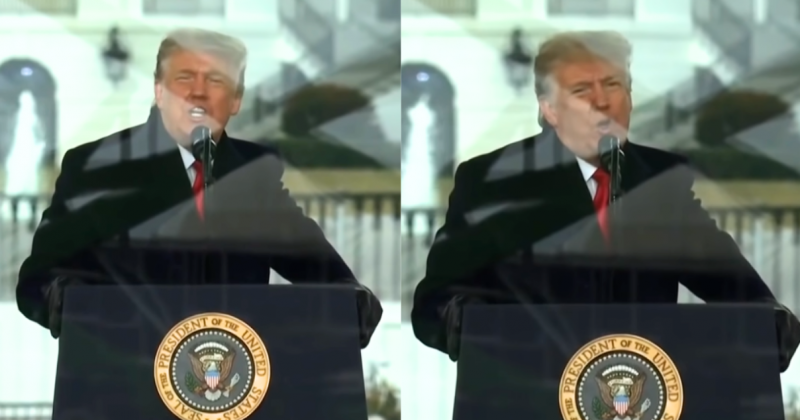An internal whistleblower report has exposed how the BBC deliberately edited President Donald Trump’s January 6 speech to make it appear he incited violence at the Capitol.
The damning revelation comes from a 19-page dossier that details how the British broadcaster misled viewers just one week before the 2024 presidential election.
The Panorama special aired its distorted coverage at a critical moment in American politics.
According to the Telegraph, which obtained the internal memo, the program “completely misled” viewers through selective editing and manipulative presentation.
The BBC showed Trump telling rally attendees he was going to walk with them to the Capitol to “fight like hell.”
The network accompanied this footage with ominous music and video of crowds gathering at the Capitol.
Crucially, nothing in the broadcast indicated that the footage and speech had been heavily edited.
The reality was starkly different.
Trump had actually told the crowd he would walk with them to “peacefully and patriotically make your voices heard.”
The “fight like hell” comments came approximately an hour later during a separate portion of his speech when he was discussing what he characterized as corrupt elections.
Michael Prescott, a former member of the BBC’s standards committee, compiled the explosive dossier documenting the network’s bias.
The report highlighted what it described as “mangled” footage from the day’s events, per the Telegraph. According to the internal report, the Panorama program made Trump “say things [he] never actually said.”
The network accomplished this deception by splicing footage from the beginning of his speech with comments made nearly an hour later in his address.
The one-hour special carried the title “Trump: A Second Chance?”
The program showed men waving flags and marching on the Capitol immediately after Trump’s words.
This editing “created the impression Trump’s supporters had taken up his ‘call to arms,’” the report stated. However, the footage of people marching had actually been recorded before Trump even began speaking.
This timeline manipulation fundamentally distorted the sequence of events that day.
The report did not mince words about the severity of the BBC’s actions.
It stated that the program’s “distortion of the day’s events was so egregious that viewers would ask: ‘Why should the BBC be trusted, and where will this all end?’”
Even more troubling, the report claimed that the BBC’s chairman and senior executives ignored complaints raised by the corporation’s own standards watchdog.
When concerned parties brought the issue to management’s attention, they reportedly “refused to accept there had been a breach of standards.”
Prescott attempted to alert BBC Chairman Samir Shah about the situation.
He warned Shah of the “very, very dangerous precedent” established by the special’s deceptive editing practices. Prescott never received a response to his concerns.
Following his departure from his advisory role, Prescott sent the comprehensive report to the BBC Board.
In an accompanying letter, he wrote: “I departed [from the advisory role] with profound and unresolved concerns about the BBC…my view is that the Executive repeatedly failed to implement measures to resolve highlighted problems, and in many cases simply refused to acknowledge there was an issue at all.”
Prescott viewed the program himself and immediately noticed its “distinctly anti-Trump stance.”
The special featured 10 Trump critics compared to just one supporter.
Prescott said he was “shocked” to discover the BBC produced no similar investigative program examining Kamala Harris.
Regarding the manipulated footage, Prescott made a particularly significant observation.
“It was completely misleading to edit the clip in the way Panorama aired it,” he said.
“The fact that [Mr. Trump] did not explicitly exhort supporters to go down and fight at Capitol Hill was one of the reasons there were no federal charges for incitement to riot.”
WATCH:

